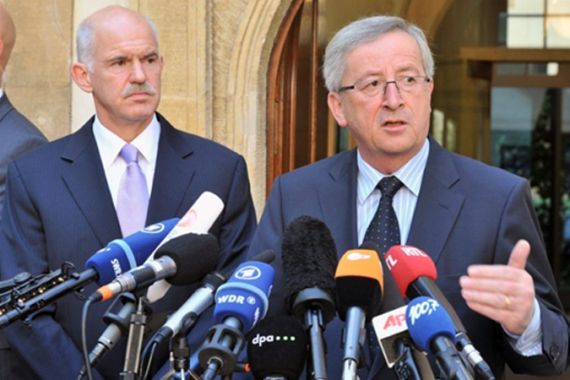Greece to get next aid tranche in July
Country set to receive next 12 billion euro tranche of its bailout after surrendering further autonomy on policies.

 |
| Greek Prime Minister Papandreou said that despite “big sacrifices by the Greek people, still much has to be done” [AFP] |
Greece is set to received the latest instalment of its bailout facility, and is also likely to receive further rescue loans to prevent it from defaulting on its massive debts, European officials say.
Debt inspectors from the European Union and the International Monetary Fund said on Friday that Greece should be receiving its next 12 billion euro tranche from its existing 110 billion euro bailout as long as additional austerity and privatisation measures are deemed to be sufficient.
Keep reading
list of 4 items‘Triple spending’: Zimbabweans bear cost of changing to new ZiG currency
Boeing hit with 32 whistleblower claims, as dead worker’s case reviewed
US imposes new sanctions on Iran after attack on Israel
As the international inspectors completed their almost month-long mission in Athens, the Greek capital, Jean-Claude Juncker, who chairs the group of 17 eurozone finance ministers, said he expects that Greece will be getting additional help as long as it is able to fulfill its promises on financial and government policy.
“I expect the eurogroup to agree on additional financing to be provided to Greece, under of course strict conditionality,” Juncker said in Luxembourg, following a meeting with George Papandreou, the Greek Prime Minister.
Papandreou said that despite “big sacrifices by the Greek people, still much has to be done. At the same time we have seen that the markets remain sceptical and this is why we are now discussing about additional financial support”.
Juncker also announced that private institutions, such as banks and investment funds, will be sharing some of the burden of giving Greece more time to get its economy back on track. That suggestion has faced criticism from the European Central Bank, which fears the move could cause panic in European financial markets.
“This conditionality will include private sector involvement on a voluntary basis and this private sector involvement will have to be negotiated with private creditors,” Juncker said.
He later told the Associated Press news agency that eurozone countries had not yet decided what this involvement will look like in practice.
On the basis of the new measures, Juncker said “it’s obvious there will be not be an exit of Greece from the euro area, there will be no default and Greece will be able to fully honour its obligations”.
Private involvement
Representatives from eurozone finance ministers have been discussing several options for getting private crediors involved in the process, including asking them to either giving Greece more time to repay its bonds or committing to buying new bonds as the old ones expire. The measures involved them will amount to about 60 billion euros worth of debt.
They have, however, ruled out the possibility of forcing private institutions to accept less than what they are owed for their investments.
Juncker was speaking after the European Union, European Central Bank and the IMF, collectively known as the troika, gave Greece more breathing room as it tries to service its debts.
The 12 billion euro tranche, which will likely be paid out in early July following approval from both the IMF’s board and the eurogroup, was dependent on the latest inspection. Without it, Greece would likely have defaulted on its debts.
“Overall, significant progress, in particular in the area of fiscal consolidation, has been achieved during the first year of the adjustment program,” the three institutions said.
They added that they expect the Greek economy to stabilise by the end of the year.
The prevalent view in financial markets has been that Greece, which can no longer raise money through bond sales due to prohibitively high interest rates, would need another bailout to plug a potential funding gap of between 60-70 billion euros over the next two years.
The protracted negotiations with debt inspectors in Athens dealt both with the steps Greece has been taking to reform its economy and with a program of additional measures to be undertaken from 2012 to 2015.
The country’s finance ministry said that a number of measures were discussed, including speeding up a 50 billion euro privatisation programme that seeks to raise funds for the country.
The ministry said that talks had ended “positively”.
In return for continued funding, “monitoring mechanisms” will be put into place to ensure that Greece implements structural reforms that are already under way, including to healthcare and the labour market.
Greece is seeking to narrow its deficit to 7.5 per cent of GDP by the end of this year, from 10.5 percent in 2010. To achieve that, Finance Minister George Papaconstantinou last month announced remedial austerity measures worth about 6.4 billion euros for 2011.
Austerity measures, both planned and implemented, have in the past sparked frequent protests and strikes in the country.
Greece’s current debt load is about 350 billion euros.